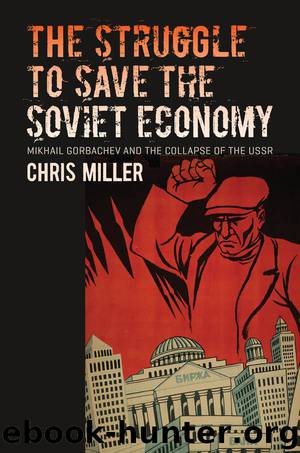The Struggle to Save the Soviet Economy: Mikhail Gorbachev and the Collapse of the USSR (The New Cold War History) by Chris Miller

Author:Chris Miller [Miller, Chris]
Language: eng
Format: epub
Publisher: The University of North Carolina Press
Published: 2016-10-12T22:00:00+00:00
The Fate of Soviet Special Economic Zones
In the end, there was no tremendous inflow of foreign capital to the Soviet Union, nor did the USSR and its successors enjoy a manufacturing renaissance spurred by foreign trade and investment. By the early 1990s, special economic zones were associated more with tax evasion than with economic reconstruction. As the central government continued disintegrating in the early years after the collapse of the Soviet Union, local and regional governments in Russia took advantage of special economic zones to help individuals and corporations reduce their taxes, much as offshore banking centers such as Bermuda and the Cayman Islands do for multinational corporations today.98 A zone created in Ingushetia—a small, conflict-ridden province surrounded by the Caucasus Mountains and located far from international trade routes—was estimated to have cost the Russian government $5 billion in lost tax revenue in 1994.99 This was no path to economic rejuvenation. Yet abuses such as this are evidence not that the Soviet Union’s foreign trade strategy failed but that the central government’s ability to enforce basic rules had all but collapsed.
Had the Soviet Union not disintegrated amid a terrible economic crisis, special economic zones might have yielded some benefits. Indeed, as late as 1991, Soviet specialists were carefully developing their understanding of how to make such zones work. In May 1991, for example, the Institute of the World Economy and International Relations hosted a seminar, “The Creation and Functioning of Special Economic Zones: Comparative Analysis of the Experience of the PRC and the USSR.”100 The seminar provided an opportunity for Soviet academics and officials to share ideas and seek advice from Chinese experts.101 The seminar took the form of a question-and-answer session, with Soviet officials airing problems their special economic zones faced, and Chinese officials suggesting lessons from China’s experience.102 Ma Yuanlian, the deputy director of the Institute of Scientific and Technical Information of Shanghai, pointed out that Shanghai’s special zones for economic and technical development succeeded because they provided significant tax benefits: joint ventures paid no tax on foreign currency earnings for the first three years, and 40 percent after that.103 One Soviet scholar, A. Anisimov, argued that Soviet zones had not worked because Soviet enterprises were not structured like Western corporations. Others suggested they were simply too small. B. Filatov pointed out that “one zone could hardly create a market environment” because it did not constitute a “critical mass of competing enterprises, which are necessary for a well-functioning market.” “Many of the participants,” noted the official account of the meeting, “raised questions about the legal provision and governance mechanism of zones.” Legislation chartering the zones, the report argued, began “without the presence of a shared conception” of what the laws would entail.104
In the aftermath of the Soviet Union’s collapse, many critics in Russia and in the West castigated Soviet and later Russian policymakers for paying insufficient attention to the institutions that underlie a market economy, such as the rule of law, secure property rights, and effective regulation.105 Some
Download
This site does not store any files on its server. We only index and link to content provided by other sites. Please contact the content providers to delete copyright contents if any and email us, we'll remove relevant links or contents immediately.
| Africa | Americas |
| Arctic & Antarctica | Asia |
| Australia & Oceania | Europe |
| Middle East | Russia |
| United States | World |
| Ancient Civilizations | Military |
| Historical Study & Educational Resources |
Red Famine: Stalin's War on Ukraine by Anne Applebaum(2929)
Midnight in Chernobyl by Adam Higginbotham(2541)
Chernobyl by Serhii Plokhy(2535)
Midnight in Chernobyl: The Untold Story of the World's Greatest Nuclear Disaster by Adam Higginbotham(2222)
The House of Government by Slezkine Yuri(2200)
Red Shambhala by Andrei Znamenski(2193)
The Gulag Archipelago (Vintage Classics) by Aleksandr Solzhenitsyn(2096)
Red Notice by Bill Browder(2070)
All the Kremlin's Men by Mikhail Zygar(2064)
From Cold War to Hot Peace by Michael McFaul(2029)
Putin's Labyrinth(2016)
From Russia with Lunch by David Smiedt(1971)
The Future Is History by Masha Gessen(1904)
A People's Tragedy by Orlando Figes(1864)
The Romanovs by Simon Sebag Montefiore(1820)
How to Tame a Fox (and Build a Dog): Visionary Scientists and a Siberian Tale of Jump-Started Evolution by Lee Alan Dugatkin & Lyudmila Trut(1770)
Putin's Labyrinth: Spies, Murder, and the Dark Heart of the New Russia(1745)
The Lost Spy by Andrew Meier(1745)
Art and Revolution by John Berger(1721)
